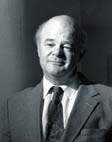 These are exciting times for those of us involved with the cancer program at UC Davis. Hsing-Jien Kung, our new director of basic research, has moved his lab into the research building in Sacramento. As we had hoped, his presence has lent an air of enthusiasm and energy to the cancer research program on campus. This year we expect to recruit three additional basic scientists to join him. The signal transduction program which he directs will play a vital role in our march toward achieving designation as a comprehensive cancer center from the National Cancer Institute, both as a program within itself and by bringing increased cancer-related scientific experience to other UC Davis programs. Our oncology, prostate cancer, and developmental therapeutics programs will benefit greatly from this increased emphasis on signal transduction research. Kit Lam, a clinical scientist from the University of Arizona, has been recruited to be chief of the hematology/oncology division of the Department of Internal Medicine. We are greatly anticipating his arrival this spring. In addition to his clinical expertise, Lam is an expert in recombinatorial chemistry. He brings with him a strong research program that will further strengthen our integrated cancer research efforts on campus. The PO1 grant for the radioimmunotherapy program led by Sally and Gerald DeNardo has again been renewed. This exciting program, one of the leading radioimmunotherapy programs in the country, concentrates not only on the basic science of radioimmunotherapy but on three very well established translational areas: lymphoma, breast cancer and prostate cancer. With the increasing clinical trials and translational research projects, we look forward to a great synergy between this program and the molecular correlative laboratory run by Paul Gumerlock. This form of cancer care is already involved in a number of studies that involve Phase I/Phase II clinical trials of new anti-cancer agents. Finally, in the past six months, the University of California Board of Regents has approved an agreement in which the UC Davis Cancer Center will develop two regional cancer centers. The first to be completed is in conjunction with Mercy Hospital and Health Services in Merced, and the second is with Fremont-Rideout Health Group in Yuba City. We are very excited about the opportunities this gives the cancer center to interact with these communities. We envision a link between these community-based hospitals and UC Davis through the pioneering use of telemedicine in cancer. Sincerely,
Home |
Table of Contents |
To our Readers |
Building on Basics UC Davis Health System | © 2000, 2001, 2002 UC Regents. All rights reserved. |
Ralph
deVere White, |

